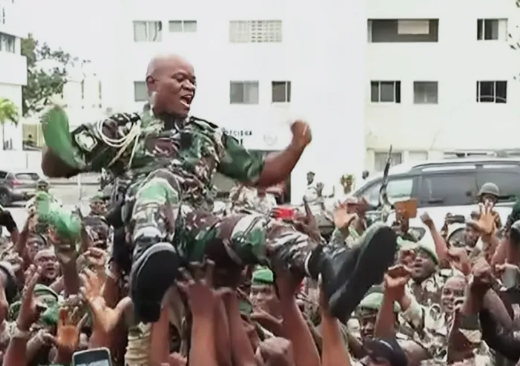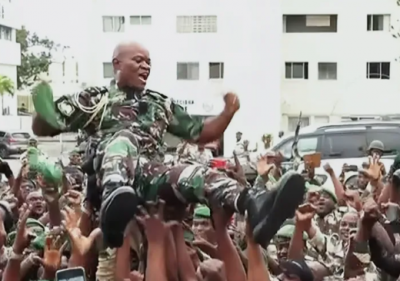A study published by the "Future Center for Research and Advanced Studies" in Abu Dhabi has outlined potential scenarios following the military coup against Gabonese President Ali Bongo, who won a third term before being ousted by army forces. General Brice Oligui (48 years old) has temporarily assumed the presidency. The paper presents several possible scenarios for the near future, which can be summarized as follows:
**Closer Ties with Russia**
The new military council in Gabon may seek to strengthen its relationship with Russia, at the expense of previous ties with France. This scenario is based on assessments suggesting the possibility of Russian involvement in supporting the recent coup, amid Russian efforts to expand its influence in Central Africa. However, according to the "Future Center for Research and Advanced Studies," there are currently no indicators supporting this path. This scenario could become more likely if pro-coup public demonstrations in Gabon feature Russian flags.
**Maintaining Western Ties**
This scenario remains the most probable at present, assuming that the coup is supported by the West or at least that Western powers have successfully coordinated with the military leaders in Gabon to secure their interests and prevent the new military council from aligning with Russia. The recent statements from Gabon’s military leaders, which reflect efforts to reassure the West and avoid tensions with Western powers, may support this scenario.
**Counter-Coups**
Despite the current public support for the military coup that overthrew the Bongo regime, recent statements by Gabonese opposition forces urging coup leaders to recognize their presidential candidate, Albert Ondo Osa, as president, reflect signs of potential increasing tensions within Gabon in the near future. The previously mentioned paper notes that the leader of the new military council is a cousin of the ousted president Ali Bongo, and thus he can be considered part of the Bongo system. Therefore, it is possible that rising political unrest could lead to counter military coups in Gabon. The paper assesses that the political situation in Gabon remains characterized by significant uncertainty, complicating predictions regarding any of the aforementioned scenarios. The situation may become even more ambiguous due to Gabon’s unique position compared to other Central and West African countries that have experienced previous military coups.
Consequently, the document suggests there is a cautious anticipation among internal and external parties regarding the direction of Gabon's new military council, but it is expected that the coming period may see more military coups in Central Africa, especially given the ongoing and intensifying international competition.
**Contexts of the Military Coup**
On another note, assessments regarding the contexts of the recent military coup in Gabon and the external parties potentially involved in supporting it vary. Some attribute the coup to unannounced Russian support, according to the newspaper "Hespress," while other research activities suggest a possible British role. Despite Gabon’s historical and close relationship with France, it joined the British Commonwealth in June 2022, becoming one of the few members not previously colonized by Britain.
Some analysts view this as a preemptive step by France, linking the recent coup led by General Brice Oligui Nguiema to an arms deal between Gabon and France in late July, which involved equipping the Gabonese Republican Guard with four French “AML-90” armored vehicles, making it the most powerful and well-equipped force in Gabon.
The paper also highlights new American aspirations in Africa, linking the recent coup in Gabon to U.S. efforts to strengthen its influence on the continent. In this regard, some Western reports indicate ongoing U.S. ambitions aimed at undermining French influence in West and Central Africa while bolstering American presence.




